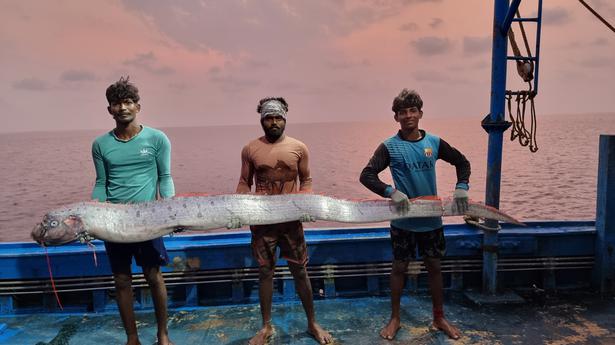
Goodbye, dolphin: Thoothukudi fishermen reconunt their rescue mission
The Hindu
A Thoothukudi fisherman describes his recent encounter with the gentle mammal, the video of which has been going viral on social media
The sea holds many surprises. For 16-year-old fisherman I Praveen, it came in the form of a gigantic dolphin that got entangled in his net. He was part of a nine-member crew that set out to sea from Thoothukudi on his uncle’s gillnet boat when the encounter happened. “It was around 8am,” recalls Praveen, speaking over phone. “We were at deep sea when the big guy flipped about in our net after getting caught.”
Dolphins are protected under the Wildlife (Protection) Act, 1972 and therefore, catching them is a punishable offence in India. “My seniors immediately devised a plan to release it,” says Praveen. What followed was a one-and-a-half hour-long operation. Praveen jumped into the water to tug at the portion of the net that was wound around the mammal’s face.
“I was scared at first,” says Praveen, who started fishing with his uncle only two years ago. “The dolphin was huge and one flip of its tail had the potential to kill me,” he recalls. But soon, he was one with the moment. He swam above the giant in distress, gently easing its pain. A fellow fisherman documented a few minutes of this rescue operation that took place in March this year, on his mobile phone. A Robert, who runs the Indian Ocean Fishermen YouTube channel and Facebook page, shared it last week.
Robert says it is common practice for fishermen to release protected species back into the sea. “Sometimes, the most fascinating creatures get caught in our nets,” he says, recalling an incident that took place in April this year. It was early in the morning and his team had cast a net for tuna.
In the stillness of the blue-orange sea, he noticed an unearthly glow in the net. The men looked at the creature, their eyes wide open: it was a gigantic oarfish that resembled the mythical dragon. They couldn’t believe their eyes. “We’d never seen anything like it,” says Robert, of the fish, which is associated with sea monster legends in Japan. “Sadly, the fish was dead when we rescued it. It must have got caught a few hours before we spotted it,” says Robert.
The dolphin, however, swam away energetically after its ordeal. “I wanted to climb on to it’s back and swim with it,” laughs Praveen. He didn’t have the heart to let go of his gigantic friend. “I think he too started liking me,” says Praveen, adding, “I planted a kiss on him before he disappeared into the water.”

“Writing, in general, is a very solitary process,” says Yauvanika Chopra, Associate Director at The New India Foundation (NIF), which, earlier this year, announced the 12th edition of its NIF Book Fellowships for research and scholarship about Indian history after Independence. While authors, in general, are built for it, it can still get very lonely, says Chopra, pointing out that the fellowship’s community support is as valuable as the monetary benefits it offers. “There is a solid community of NIF fellows, trustees, language experts, jury members, all of whom are incredibly competent,” she says. “They really help make authors feel supported from manuscript to publication, so you never feel like you’re struggling through isolation.”

Several principals of government and private schools in Delhi on Tuesday said the Directorate of Education (DoE) circular from a day earlier, directing schools to conduct classes in ‘hybrid’ mode, had caused confusion regarding day-to-day operations as they did not know how many students would return to school from Wednesday and how would teachers instruct in two modes — online and in person — at once. The DoE circular on Monday had also stated that the option to “exercise online mode of education, wherever available, shall vest with the students and their guardians”. Several schoolteachers also expressed confusion regarding the DoE order. A government schoolteacher said he was unsure of how to cope with the resumption of physical classes, given that the order directing government offices to ensure that 50% of the employees work from home is still in place. On Monday, the Commission for Air Quality Management in the National Capital Region and Adjoining Areas (CAQM) had, on the orders of the Supreme Court, directed schools in Delhi-NCR to shift classes to the hybrid mode, following which the DoE had issued the circular. The court had urged the Centre’s pollution watchdog to consider restarting physical classes due to many students missing out on the mid-day meals and lacking the necessary means to attend classes online. The CAQM had, on November 20, asked schools in Delhi-NCR to shift to the online mode of teaching.









